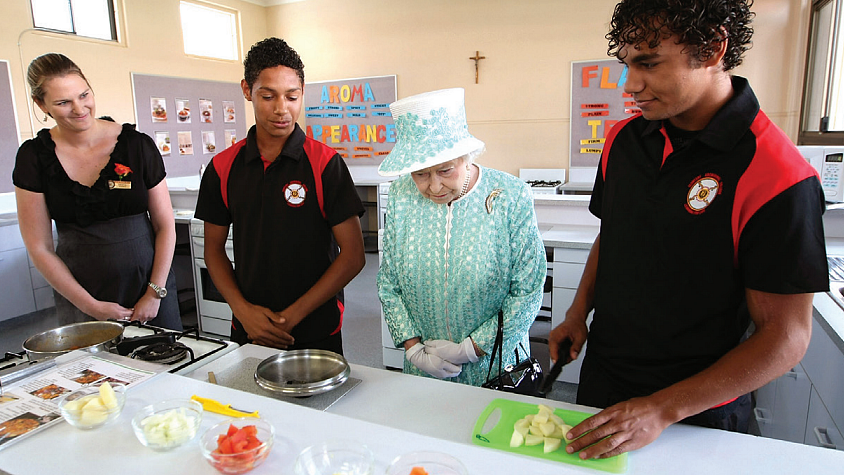London Diary: special cookbook with recipes from India, Pakistan to mark the queen's platinum jubilee
Besides the Queen’s Platinum Jubilee next month, London is talking animatedly about BBC spending the equivalent of Rs 480 Crore on research to find out what the viewers want to watch

Queen’s Jubilee cookbook
Queen’s Platinum Jubilee celebrations next month will be marked by a special cookbook with 70 recipes from around the world, including India and Pakistan.
The recipes have been recommended by British embassies and high commissions in different countries ranging from marmalade, courtesy the British embassy in Madrid, to green fish curry at the instance of the high commission in Islamabad.
The cookbook, which will have a foreword by Prince Charles and his wife, the Duchess of Cornwall, will also include anecdotes about the use of food in British diplomacy. Charles and Camilla acknowledge the contribution of international food to the diversity of modern British food.
“Seventy years ago, when the Queen came to the throne, the culinary outlook in the United Kingdom was bleak: Meals from other parts of the world were almost unheard of. The only option for a takeaway was the everfaithful fish and chips and olive oil was sold in small bottles by chemists, for medical rather than culinary use.” The arrival of cuisine from other countries has given British food an international flavour, and I dare say made it more palatable.
BBC wants to know you
Believe it or not, but one of the world’s oldest and most famous broadcasters which has been telecasting to millions of viewers around the world for decades apparently doesn’t know what people want to watch.
That’s the BBC for you.
It is to spend £50 million (roughly Rs 483 Crore) on research to find out what viewers are watching in an attempt to improve its programmes. Of this, some £42 million will go to “continuous tracking” research described as the “most complex and strategic” part of the four-year project. It will study viewers’ experience of the broadcaster and their satisfaction with its output, according to media reports.
Another £6.5 million will be spent on “bespoke research” on “harder- to -reach, niche and diverse audiences”. And the remaining on seeking insight into “how children discover our content, how children find and consume media and who is influential in helping them choose”, says the tender document revealed by the Daily Star Sunday newspaper.
Not surprisingly, the move has attracted scathing criticism with critics calling it a waste of licence-fee payers’ money at a time when it’s struggling to balance its budget. It’s also facing the prospect of losing government funding with its hundred-year-old funding model up for review.
“Taxpayers are sick of seeing their hard-earned money bankroll big BBC projects,”said a spokesperson for TaxPayers’ Alliance.
For once even its ardent admirers who believe it is mostly unfairly targeted by right-wing politicians and media will struggle to defend it.
Not so "Great" Britain
There's a "Great Britain" where supposedly everything is "world class" --from the health service and education to transport and moral values. And thenthere's real Britain where the health service is perpetually on the brink; educational standards are falling; transport is in crisis; and as for moral values just ask Boris Johnson.
A new survey is telling of the state of modern Britain. It shows that one third of businesses say that their workforce is lacking basic literacy and numeracy skills.
Fifty per cent said that their organisation would be more productive if the education system were better tailored to future employment. Eighty-nine per cent said that it was important for young people to be assessed on more than academic skills.
The survey by The Times Education Commission found that the education system was not preparing young people for the world of work. Skills such as better time management, teamworking skills and resilience, could increase productivity and help youths find jobs and increase career opportunities.
It is estimated that reforming education would boost UK economy by £125 billion. That’s how much illiteracy is costing Britain.
Say cheese, please!
Can’t tell your Cheddar from your Camembert? Confused by what you see on the after-dinner cheese board?
Chill. Now there's an App to identify what sort of cheese you are eating. Cheezam, the French App (anything to do with cheese has to be French),has been described by Libération as a “miracle” that will save a lot of people a lot of blushes.
Cheese, anyone?
Baldness & sexism
A British employment tribunal has held that it is sexist to mock men for their baldness in the workplace, and ruled in favour of a factory worker who sued his boss for using a four-letter word to describe his baldness.
“As baldness is much more prevalent in men than women, we find it to be inherently related to sex,” ruled the three-member panel.
But women have questioned the ruling pointing out that according to the American Hair Loss Association some 40 per cent of women also suffer from hair loss. And among them is Hollywood celebrity Jada Pinkett Smith, who was infamously mocked by Chris Rock for being bald at the Oscars.
And, lastly, UK foreign secretary Liz Truss has been called a “human hand grenade who blows up anything she touches”.
(This was first published in National Herald on Sunday)
Follow us on: Facebook, Twitter, Google News, Instagram
Join our official telegram channel (@nationalherald) and stay updated with the latest headlines
